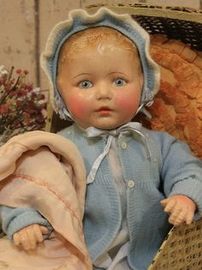Lambert (dolls)
Brand
Léopold Lambert was born in Aix-en-Provence in October, 1854. His parents owned a hotel, their business was rather successful and they expected that the son would continue the family venture. However, since his childhood the boy showed creative abilities, drawn and made curious art items from wood and clay very often. Later he was an apprentice of the famous automata master, Gustav Vichy.
Seizing all on the fly, Leopold Lamber quickly mastered the dolls’ production and very soon became the senior supervisor. In 1886, Lamber decided to open his own business - a workshop for production of the mechanical dolls, musical automata and expensive luxury items similar to products by Vichy.
Subject ID: 44346
MoreLéopold Lambert was born in Aix-en-Provence in October, 1854. His parents owned a hotel, their business was rather successful and they expected that the son would continue the family venture. However, since his childhood the boy showed creative abilities, drawn and made curious art items from wood and clay very often. Later he was an apprentice of the famous automata master, Gustav Vichy.
Seizing all on the fly, Leopold Lamber quickly mastered the dolls’ production and very soon became the senior supervisor. In 1886, Lamber decided to open his own business - a workshop for production of the mechanical dolls, musical automata and expensive luxury items similar to products by Vichy.
Several years earlier, in 1876 Lamber got married. The Parisian tailor Eugénie Maria Bougeois became his spouse. After the wedding, she assisted to Lamber, making sketches of suits and sewing clothes for the dolls, which were made in the workshop.
Mechanical automata from Lamber's workshop were very popular and were sold well. He actively participated in various exhibitions and always knew how to amaze the experienced public. The 90-cantimeter, singing serenades doll of Mephistopheles presented by Lamber at the World Fair of 1900, became one of the most discussed exhibits. Then followed success at the exhibitions in Liege in 1904 and in Milan in 1905.
By 1910, mechanical dolls gradually were substituted by electric novelties; mechanical automata were sold worse. Gradually Lamber's entity began to fall into decay. The toughest times followed the end of World War I – in the starving and destroyed Europe, nobody was eager to buy dolls. The latest years of his life, the master lived on a small allowance from his son Lusien. He died in Paris, in spring of 1935.
Subject ID: 44346
Subject ID: 44346
